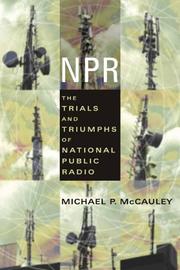| Listing 1 - 2 of 2 |
Sort by
|

ISBN: 0231121601 0231509952 Year: 2005 Publisher: New York Columbia University Press
Abstract | Keywords | Export | Availability | Bookmark
 Loading...
Loading...Choose an application
- Reference Manager
- EndNote
- RefWorks (Direct export to RefWorks)
The people who shaped America's public broadcasting system thought it should be "a civilized voice in a civilized community"-a clear alternative to commercial broadcasting. This book tells the story of how NPR has tried to embody this idea. Michael P. McCauley describes NPR's evolution from virtual obscurity in the early 1970's, when it was riddled with difficulties-political battles, unseasoned leadership, funding problems-to a first-rate broadcast organization. The book draws on a wealth of primary evidence, including fifty-seven interviews with people who have been central to the NPR story, and it places the network within the historical context of the wider U.S. radio industry. Since the late 1970's, NPR has worked hard to understand the characteristics of its audience. Because of this, its content is now targeted toward its most loyal listeners-highly educated baby-boomers, for the most part-who help support their local stations through pledges and fund drives.
National Public Radio (U.S.) --- Public radio --- United States --- Radio broadcasters --- Non-commercial radio --- Noncommercial radio --- Public broadcasting --- Radio broadcasting --- Public service radio programs --- NPR --- Association of Public Radio Stations (U.S.) --- WBEZ (Radio station : Chicago, Ill.) --- National Story Project (U.S.) --- KCRW (Radio station : Santa Monica, Calif.) --- WGBH (Radio station : Boston, Mass.)
Book
ISBN: 3030800199 3030800180 Year: 2021 Publisher: Cham, Switzerland : Springer,
Abstract | Keywords | Export | Availability | Bookmark
 Loading...
Loading...Choose an application
- Reference Manager
- EndNote
- RefWorks (Direct export to RefWorks)
Public radio --- History. --- National Public Radio (U.S.) --- Non-commercial radio --- Noncommercial radio --- Public broadcasting --- Radio broadcasting --- Public service radio programs --- NPR --- Association of Public Radio Stations (U.S.) --- WBEZ (Radio station : Chicago, Ill.) --- National Story Project (U.S.) --- KCRW (Radio station : Santa Monica, Calif.) --- WGBH (Radio station : Boston, Mass.)
| Listing 1 - 2 of 2 |
Sort by
|

 Search
Search Feedback
Feedback About UniCat
About UniCat  Help
Help News
News